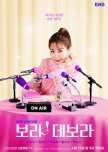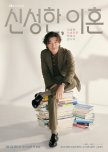
When Life Gives You AI
Oh dear. First two eps were great. Wonderful chemistry and not a bad setup. But then...It feels like the plot has been written using AI. “AI, write a scene where two me are competing for the same woman”. “AI, write a scene where a man and a woman are forced to reveal their true feelings”.
I tried. I really tried. But this is just terrible.
Was this review helpful to you?

After my third viewing…
This series is just wonderful. Each time I reach the end I immediately begin to miss the characters and have to jump back in.The poster, to me, is misleading, suggesting something lightweight and fluffy. But that’s not what it is about.
Everything feels so real and raw. The drama is heartbreaking without descending into melodrama; the comedy is laugh out loud and the characters are so endearing I want to move to Korea and spend time with them.
In particular the friendship between Bo-ra and Yeo-jeong is gorgeous and so very real. I just wanna hang out with those two and be the butt of their jokes.
With one minor exception I won’t go into, the screenplay is flawless and delivers an unexpected feminist message. The decision to limit the series to only 14 episodes shows the team’s commitment to quality.
I can’t recommend True to Love too highly.
Was this review helpful to you?

This review may contain spoilers
So many questions…
Yoo Yeong-ah’s ability to write engaging friendships with witty dialogue is unquestioned. Thirty-Nine is one of my favourite series.The entire cast here turns in spot-on performances. I seriously loved this show right up to the last episode, which left me feeling frustrated and angry.
So, I am left with questions **spoilers coming**.
Why was the main character given so little growth? Sure he achieved his goal but the next thing we know he’s back out getting drunk with his (incredibly endearing) buddies, despite the new responsibilities he has fought so hard to obtain.
What was the point of the Lee Seo-jin character? I know not all shows can or should have a romantic relationship foremost but with two characters - single parents of somewhat troubled boys of similar ages - all the groundwork was there for a wonderful friendship- romance or not. But she just fell into a third-string cameo by the end. How did the writer lose sight of what she herself had set up so well?
And, lastly, how was this written by a woman, when it celebrates men behaving like boys (well, at least Jung Hyeong-geun grew up) and reduces the female lead to someone who, seemingly without a will of her own, allows herself to be bunted around like a pinball. Just as she decides to support Shin Sung-han during his struggle, her bestie turns on the waterworks because she misses working with her.
Some may say regaining her career is a win for feminism but, if so, why have her develop through her work helping others using the law.
This had so much potential, only to fall flat at the end. Such a shame.
Was this review helpful to you?


